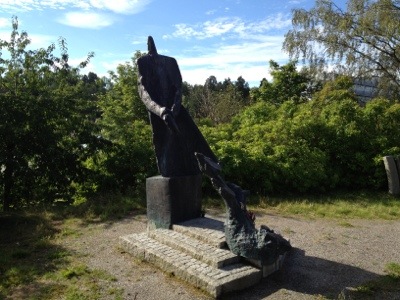Last Saturday marked the 100th anniversary of the birth of Swedish diplomat Raoul Wallenberg, who saved the lives of tens of thousands of Hungarian Jews from the Holocaust. He was born in his family’s then-summer house, here on the island of Lidingö.
This is the statue “Raoul Wallenberg’s Deeds” at Lidingö Centrum, next to the public library and perhaps 100 meters from City Hall.
In connection with the anniversary there have been some interesting articles in the press here. In Dagens Nyheter, columnist Henrik Arnstad comes up with a new revisionist view that Raoul Wallenberg actually did very little, it was the Swedish government that sent him to Budapest that did so much to save the Jews. To a certain extent that must be correct. But it aalso seems like a pathetic attempt to counter the conventional wisdom that during World War II official Sweden did everything it could to please the Nazis, until it was obvious they were going to lose. That criticism was the reason then-Prime Minister Göran Persson hosted his Holocaust conferences, trying to counter that image.
And no matter how much support Wallenberg had from Stockholm while he was in Budapest, as soon as he was captured by the Soviet Red Army, official Sweden turned its back on him. Wallenberg had diplomatic immunity, a fact that was ignored both in Moscow and Stockholm. When his support group protested to Sweden’s foreign minister Östen Undén that his Russian counterpart was lying about Wallenberg, the long-serving foreign minister could only express incredulity.
And certainly there was little support for his activities among some of the Swedish people, even in the town of his birth. Lidingö is an affluent, conservative community. In the same newspaper, journalist Erik Eriksson, who grew up on Lidingö and has written a novel about Nazism on the island, writes how he was invited to give a talk there on the topic. He spoke of Nazi rallies in the auditorium in the high school my children attended, pictures of Hitler on the walls of his neighbors’ home, lists of more than 200 Nazi supporters on the island, far more in much larger Swedish towns.
Sadly, the response from some of his listeners was just as incredulous as Foreign Minister Undén. One man said he hadn’t noticed anything like that during the war, another said something about having heard that Jewish capitalism was behind the bombing of Germany during the war so it was natural that Germans wouldn’t like Jews (I’m still trying to figure how why something that was supposed to happen during the war could create pre-war anti-semitism), while a third just said it wasn’t nice to spread such nasty thoughts.
Still, around 100 people came to Wallenberg’s birth house Saturday morning, not an easy hike for the elderly, so perhaps that says something too.

